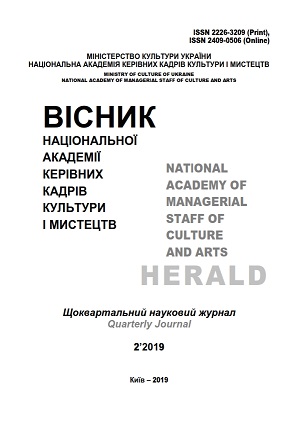Управлінська культура людських відносин
Administrative Culture of Human Relations
Author(s): Elena Yaroslavivna KovalenkoSubject(s): Business Economy / Management, Culture and social structure , Theory of Communication, Social psychology and group interaction, Sociology of Culture
Published by: Національна академія керівних кадрів культури і мистецтв
Keywords: administrative culture; human relations; industrial society;
Summary/Abstract: The purpose of the work is a theory and methodology analysis of administrative culture of human relations in the epoch of industrial which will be instrumental in enriching of science new knowledges about the cultures of management in the context of development of civilization. Methodological basis of research is dialectical principle of cognition, sociocultural and historical approaches of the systems, fundamental positions of theory and history of management culture. The scientific and interdisciplinary methods of research are used: analysis and synthesis, induction and deduction, comparison, formalization. The scientific novelty of the got results consists in an exposure and generalization of features of administrative culture of human relations of industrial society. Conclusions. As a result of research found out such the features of administrative culture of human relations of epoch of industrial, as: at first, waiver of engineering approach to the management, at which a man was part of production line; secondly, in a counterbalance to mechanistic conception of «economic man» which reacts only on incentives of wages, conception of «social man», which assumes that, went out on the first plan, except for a financial benefit, a worker aspires to satisfaction of moral necessities; thirdly, the main object of attention is a worker as personality and that is why to each individual approach is needed; fourthly, any formal organization with the officially set rules and orders is necessarily complemented informal organization, based on the moral aspects of co-operation; fifthly, transition vid hard regulation to democratization of management, humane relationships with inferiors, to respect of their idea, group decision-making; knot, consideration of management as to the process of co-operation of people, the tasks of which are taken to the study of relations of interpersonalities; seven, account of emotional factor and interests of worker, and also options of groups and traditions.
Journal: Вісник Національної академії керівних кадрів культури і мистецтв
- Issue Year: 2019
- Issue No: 2
- Page Range: 230-235
- Page Count: 6
- Language: Ukrainian

